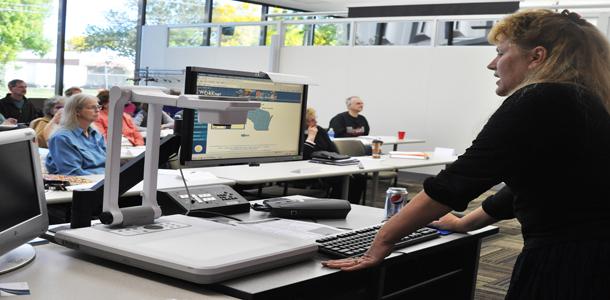With unemployment at nine percent, the job market has become ruthlessly competitive. Adults that have lost their jobs because of economic cutbacks are being thrown back into the race at a very difficult time.
Madison Area Technical College is trying to reach a need in this area. With a Center for Adult Learning, the college is able to offer free workshops and classes in math, writing and computer software education.
Alfonso Studesville is an advisor at Madison College and has worked for several years now with a group called Wiser Older Workers. The group functions both as a support group and a networking resource.
About 20 percent of the population is made up of baby-boomers. Right now they’re reaching around 65 years old. They’re leaving the job market and looking for alternative solutions to retirement or switching careers.
“I needed to form a group to explore what kind of degrees we can offer to this group, and what we can teach them to bring them up to date,” Studesville said. We need to help bring these folks into the new millennium.”
The group is diverse and welcomes adult students of all ages. The meetings, right now, comprise of about 20 people, and Studesville has worked with students from their early 20s to their 70s.
“I don’t care if you have a bachelor’s, master’s or Ph.D,” Studesville said. “All of them are coming through our office to figure out how to orchestrate their next step.”
Wiser Older Workers can help connect adult students with numerous resources. The group works through the Adult Learning Center to help adults receive credit for their previous education and to complement their abilities with current knowledge in technology, software, and job-hunting advice.
The Center for Adult Learning, located at the Commercial Ave. campus, works closely with the Wisconsin Department of Workforce Development. Because of the lower credit costs, Madison College is one of the largest participants in the Workforce Investment Act, offering short-term training and faster preparation and aid to dislocated workers. Wiser Older Workers is able to network members of the group into possible outlets through these statewide programs.
“Imagine going to school and then working for 30 years,” Studesville said. “Imagine working your entire life to build something, and then being reduced to living like you did when you were 19. It’s tragic.”
Barbara Sullivan, a member of Wiser Older Workers, grew up in Sun Prairie and worked straight from high school. She was a credit clerk. After the 1980’s, she was laid off and spent six months looking for work.
She was hired by Meriter Hospital, but after working there for several years, she again found herself without a job. She was let ago and given six months of severance pay.
“I was petrified. Then the same thing happened to my husband. We didn’t know what to do,” Sullivan said.
After attending WOW meetings, her spirits picked up, she said. She is now taking whatever free computer class she can.
Kenneth Dahl, another member of the group, graduated in Urban Design at UW-Madison. He started working at a material supply company and decided to stay. He even stayed through four changes of ownership.
“I was learning more there than I had at school,” Dahl said. “While I was there, I was able to be pretty instrumental in development on pretty much every level.” Despite his time and effort, he was laid off without severance last February.
“The trouble is we don’t get the notice that we used to,” Studesville said. A rapid response team he works with speaks with people who have lost their jobs, and gives them information about their options. The group informs them about Badger Care, other health care options and their Cobra benefits. “I used to see about 30 to 40 companies call a year. Last year I didn’t see five,” Studesville said.
Dahl’s concerns run deep. He is frustrated at the lack of organization and the lack of a central center for information.
“The places offering helpful classes are just scraping by. They have no budget to speak of, and certainly no promotional budget,” Dahl said. “We’re finding that the employers don’t understand, and that a resume doesn’t translate very often to current language. We’re seeing the need to re-learn how to phrase things. The job hunt has become more impersonal and more time-consuming.”
Both Dahl and Sullivan are members of the Wiser Older Workers advisory group. The advisory group finds out what information the group is looking for. They “find resources and fill the gaps.”
Trying to avoid redundancy, the members of the advisory group attend each meeting and try to find helpful information that the other attendees might be unaware of.
The trouble that Studesville is finding is that there are many programs that aren’t being marketed.
“Everyone knows someone who has been hit by the economic crisis. We just need to get the word out that help is here,” Studesville said.
The group faces economic setbacks as well. The federal government isn’t putting the money it used to into helping dislocated workers. The amount of money available from the state has been reduced. Normally they receive the budget in July. However, it’s still not there. Studesville suggested that Americans learn to live more frugally.
“I want to see more people involved,” Studesville said. “I dream of having employers call and seek out qualified workers, and for this group of people to function as an employment and research team.”
“Al’s our coach,” Sullivan said. “He helps us through the tough times.”
For more information
Contact Alfonso Studesville
(608) 246-6515


























